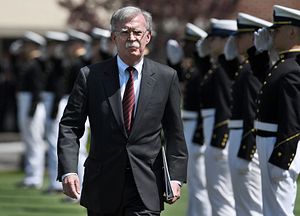On Tuesday, U.S. President Donald J. Trump announced that John Bolton would be stepping down as the assistant to the president for National Security Affairs (APNSA) — or national security advisor.
“I informed John Bolton last night that his services are no longer needed at the White House,” the U.S. president said in a tweet.
“I disagreed strongly with many of his suggestions, as did others in the Administration, and therefore … I asked John for his resignation, which was given to me this morning,” Trump continued. “I will be naming a new National Security Advisor next week,” he concluded.
Shortly after Trump’s tweets, Bolton himself tweeted that he had offered to resign Monday evening. He added that Trump had told him that they would “talk about it tomorrow.”
Bolton’s reaction suggested that he may have learned of his termination from the president’s tweet. He would not be the first prominent Trump administration official to be let go in that manner.
In March 2018, Rex Tillerson, the former secretary of state, was notified in a tweet that he would be replaced by Mike Pompeo, then the director of the Central Intelligence Agency.
Bolton’s departure marks the loss of a third national security adviser in the Trump administration. His predecessor, Lt. Gen. H.R. McMaster, lasted for a little more than one year in the role while Trump’s initial choice, Michael Flynn, stepped down in just 24 days.
Bolton came to the Trump administration with a long history in government, particularly during the Bush administration when he served as a top U.S. Department of State official on arms control and ambassador to the United Nations.
Generally seen as a foreign policy hawk, Bolton’s prescriptions appeared to clash with Trump’s preferences on a range of issues, ranging from Venezuela, to Iran, to North Korea, and, most recently, Afghanistan.
Bolton’s resignation came just days after Trump announced that he’d cancelled an apparent meeting with representatives of the Taliban and Afghan President Ashraf Ghani at the Camp David presidential retreat.
On North Korea, in particular, Bolton publicly took a divergent stand from the president, who brushed off this year’s missile testing campaign as “very standard” given that Pyongyang was testing short-range missiles.
Bolton, however, said the missile tests constituted a violation of United Nations Security Council resolutions. Bolton had also been a critic of negotiating directly with the Taliban ahead of any U.S. withdrawal or troop drawdown.
Bolton’s replacement as APNSA remains an open question.

































